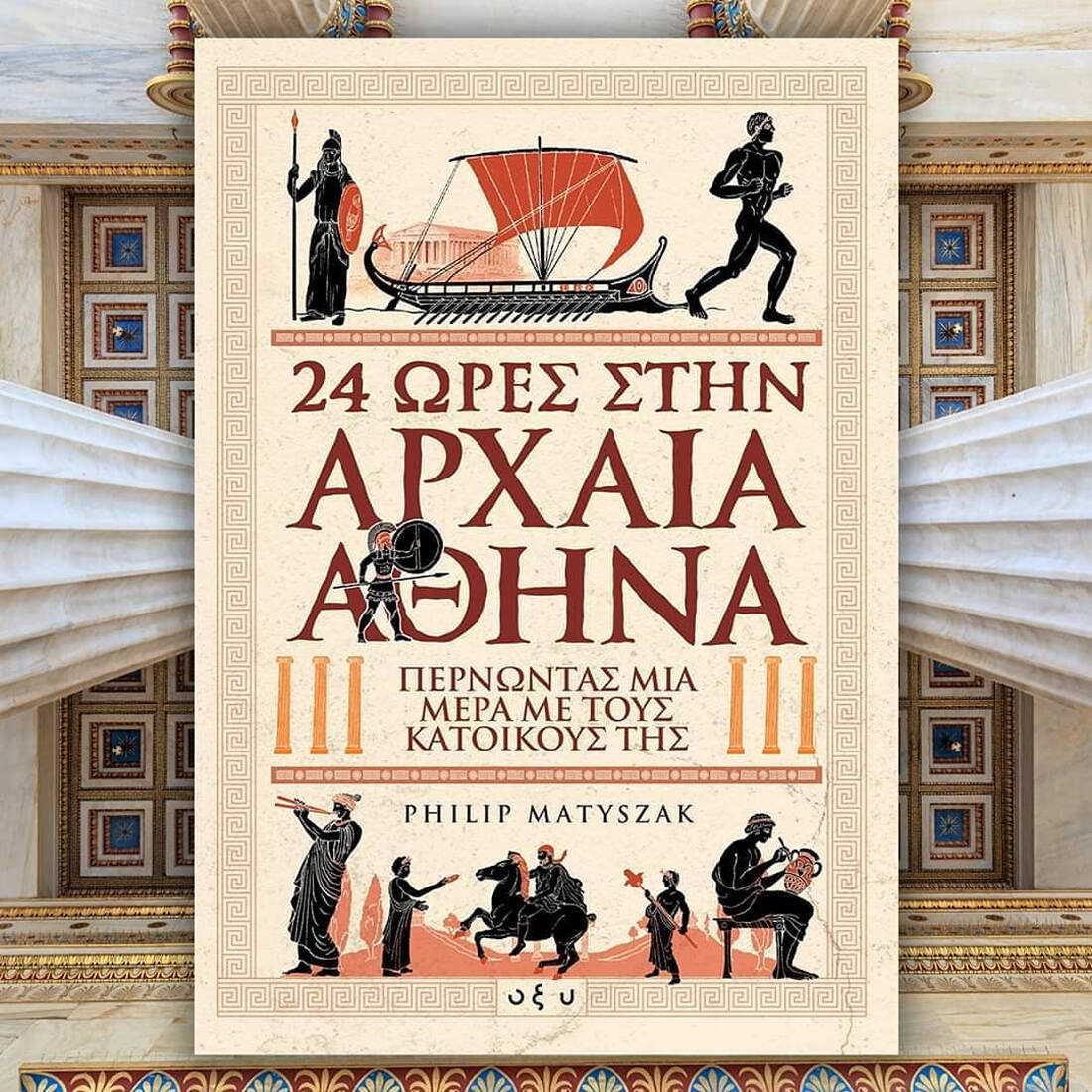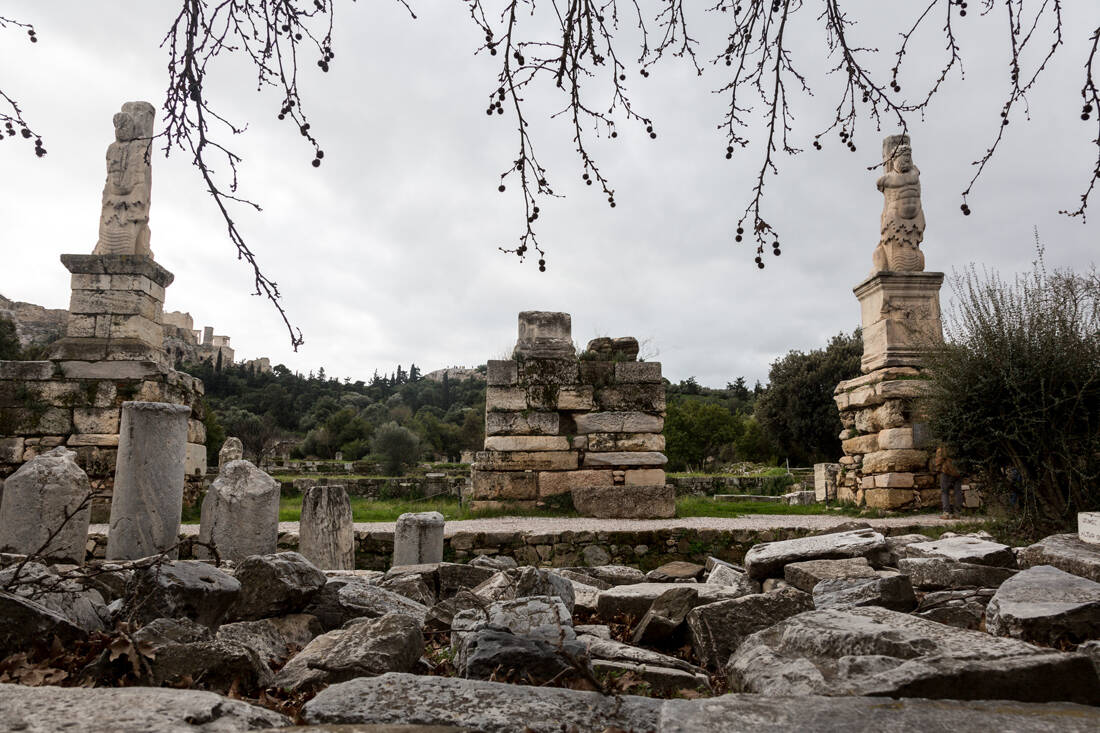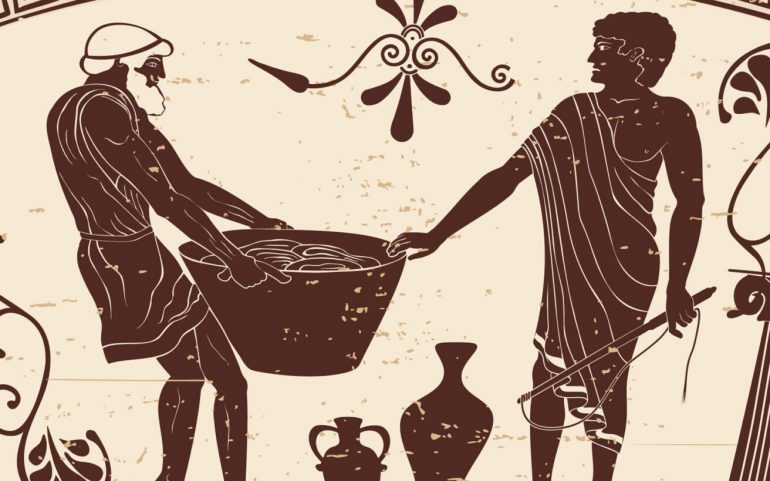How did the inhabitants of ancient Greece spend their day?
What a different one did slave in the mines by a stolar? The wife of an Athenian citizen by a hoplite? The partner from a fig smuggler?
So let's take a trip back in time to land in Athens in 416 BC, when the city-state had 30.000 inhabitants.
As the author and academic Philip Matijak observes, "in no other period of history has there been a greater concentration of geniuses per square meter"!

Philip Matijak is a professor at his University Cambridge and authority in ancient history. He has more than 20 books in his assets and has been particularly concerned with the history of the ancient Greeks and Romans.
Oxy Publications published his famous book in Greek last year "24 hours in ancient Athens», Where the academic scholar reconstructs many images from the daily life of our great ancestors.
From the temple guard and the slaves who play theater to the doctor who examines, the triarch inspecting his ship and the angiographer who begins a new work, the unknown life of the of the ancient Greeks.
In its pages are still alive the wrestling coach, the witch with her gloves, the fishmonger who sets up her counter, the wife on the sly date with her lover, the MP who takes his lunch break, the runner who starts for Sparta, the town planner who submits and much more.

He also tells us about the spy of Sparta in Athens and the smuggler of figs who arranges the illegal transfer of his wares.
His narrative is placed in the middle of the war that will end the golden age of Athens, bringing us in contact with the average Athenian citizen. Even the prominent men of the city and the officials do not cease to have daily worries and concerns to take care of.
Philip Matijak is doing something really new. That is, at a time when ancient writers show ordinary citizens only when they interact with the great personalities of Athens, he presents the important Athenians only through their meetings with the common man.
His study is of course not arbitrary, as it is based on ancient literature, the reconstruction of archaeological finds and the handed down historical studies.

In the spring of 416 BC. So, during the six-year break of the Peloponnesian War launched by Nicene Peace in 421 BC, Athens withstood the repeated attacks of the Spartans. and seemed stronger than ever. Alas, under the persuasion of Alcibiades, the city-state is planning a daring invasion of Sicily, which would put an end to the temporary cessation of hostilities.
As long as this was done at the level of central politics, the ordinary Athenian citizen had a life to live. An everyday life that is not given to anyone. So let's see what some Athenians did as their politicians and generals came up with new war scenarios…

Doctor Phoikos was woken up in the middle of the night and this time it was the guards of the Temple of Athena on the Acropolis. One of the priestesses of Athena Poliados suddenly fell ill and the doctor is afraid of the worst. The death of a priestess is in itself a horrible fact, especially since we are talking about an 11-year-old girl.
It is one of the Arrifori, "those who carry secrets", and belong to the most aristocratic families of the city. After all, they lived in the Erechtheion, in one of the most prestigious parts of the Acropolis.
Ο doctor assures anxious parents that he already has an assistant on alert. If he can not make the diagnosis or if the case is serious, he will send him to call his guest from Kos, a Hippocrates, who is said to be a great doctor.
The temple is in disarray. The illness of the priestess is not just a small thing for the city. Phoikos helps her regain consciousness and makes one of the fastest diagnoses of his career. Then he goes out to inform the small heartbeat crowd outside the room:

"She is OK. In a couple of days he will have fully recovered. Until then, I highly recommend watering and lying in bed. Give her some porridge, if her stomach can handle it. The girl was purified and the crisis passed ". "Was he purified? "Was it a bad spirit?" Her mother asks anxiously.
Phoikos remains silent, as he knows but how to say in public? He grabs the commander of the temple guard by the armpits and they go aside. "It's better not to find out about the girl's illness," the doctor tells him, "and you should tell your men a word."
"Do you want to look for the Acropolis and the magician is still hiding somewhere?", The official asks him. "Which magician?" The doctor asks. "The one who caused the girl to be possessed by the spirit," the guard replies.
"No," the doctor tells him, "I want to know how it got into her hands." And he shows him the small bottle of raw leather, what the soldiers have for their wine…

Ariston always starts his lesson by reminding everyone how important exercise is for Athens. He likes to tell them the story of Socrates scolding a friend of his, Epigenes, for being untrained.
Athens has three remarkable gyms, the Academy, the Lyceum and the Kynosarges, and Ariston works in the former. They are all built outside the city walls, as the arenas and track and field events want their space.
The Academy and the Lyceum are exclusively for the children of the citizens, while in Kinosarges the children of mixed origin and the illegitimate ones study. After all, gyms are not additions to schools, but the schools themselves. There they learn wrestling, music, dance and grammar, there also take place scientific discussions and philosophical controversies.
Ariston is third in the gym. Behind the headmaster, that is, the well-to-do boss of the gym who pays for everything out of his own pocket, and the pedophile, a former athlete who is now in charge of the exercises and diet of the young boys.

The trainer determines the wrestling pairs, he is the instructor who supervises the exercises assigned by the children. Today he is again occupied by Aristocles, a muscular young man with Heraklion shoulders who has no fair match in the fight. But he can not exclude him from the arena, as his parents are strong nobles.
And so today he decides to face him himself! There were also times when Ariston was a famous wrestler in his hometown, Argos. Then of course he thinks that such a thing would not be acceptable, and so he will put an older young man to fight with "Plato", as they say Aristocles.
"Plato" also means "wide", a common nickname for robust young people. And Aristocles is so rugged that everyone knows him as Plato. Who is not only extremely strong, but also extremely talented. After all, he literally follows the instruction of his teacher, Socrates, that you have a duty to yourself to be as healthy as possible physically and mentally.
After the fight, the music follows. Plato is not doing so well here. He has a rather weak and bad voice. No one can be perfect in everything, Ariston thinks with a sneer at this talented boy who shows zeal and seriousness in all physical and mental exercises…

Gairestos the farmer enters the dark descent of Phanagoras in Piraeus, having just returned from his orchard. Not to get drunk this time, nor to roll the dice. But to go unnoticed. The man he came to meet is already here, Nausigenis, sitting in the corner. And he is accompanied by a big, wild sailor.
The meeting must be done with every precaution. If one sees them together, one will begin to suspect their business. After all, what job does a fig grower have with a sailor if not smuggling? And the smuggling of figs, always loved by the Athenians, is something they do not take for granted.
"Will the load be normal?" The old man asks conspiratorially naval, which lives two seas away and is not usually associated with Athenians. "One-fifth fresh and the rest dried?"
Nausigenis does not have an easy task. It has to transport the extremely sensitive cargo across the Aegean and then go straight to the market in Cyzicus. If an opposite wind hits him, the whole treasure in his barn will rot. The fresher the figs, the longer they last. And when Nausigenis says fresh, he means that they have gathered on the day he will set sail. And so they will last a week at most.
Fresh Attica figs are an exquisite delicacy even in Athens itself. The transfer of the figs of Gairestos to "Nereida", which is anchored in the port, is an easy task. For months now, Gairestos has filled a pile of barrels with dried figs in a hidden basement under his warehouse on the estate.

But he remembers and curses again the Spartans, who cut down his favorite trees during the last war. Trees that I gave food to my father and his ancestors. And the Spartans destroyed them all in their catastrophic passage.
But now is the time for work. Nausigenis will pay cash as soon as he receives the goods. Gairestos will be paid this time with Greek coins of pure silver, the Attic glaucus.
Gairestos and Nausigenis, however, argued over the war. "If you do not like foreigners, then why are you selling me your figs?" "And while it is illegal?", The sailor from the Black Sea countered. The issue is delicate for Gairestos. He became a smuggler because he was charged to rebuild his orchard and did not receive any help from the Athenian state.
Nausigenis will go to Gairestos' house tomorrow, while he is on his property. He has kept two bags in his warehouse for the sailor to examine and determine their price. The "Nereid" will then set sail one of the following nights for its sandy shore Faliro and there the farmer with his barrels will be waiting for him.
A significant amount in silver coins will change hands. Even if one sees them on the shore, they will probably be like their speech. A ruined farmer smuggling his goods. And no one is betraying anyone. Nobody wants the rubber of the giver.
Those who do so are called "slanderers", a word that came out just to describe those who condemned the smugglers of figs. Nobody wants to be called a slanderer…
